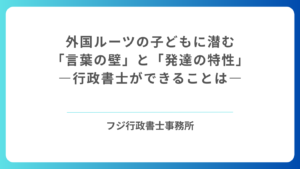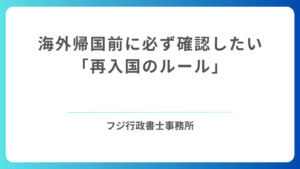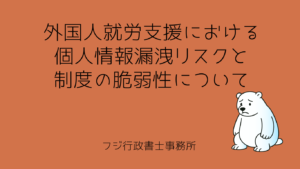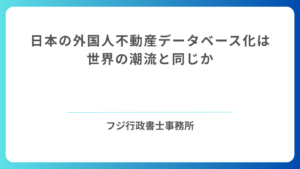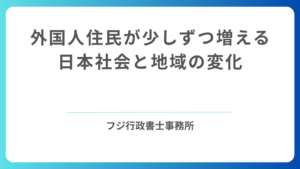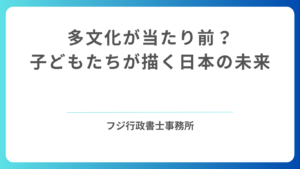日本で生活を始めたばかりの外国人の方から、私たちフジ行政書士事務所にはさまざまな質問が寄せられます。その中で意外と多いのが、「日本人って、ありがとうを言いすぎじゃないですか?」という声です。
一見ほほえましい疑問ですが、実はこの「ありがとう文化」、日本の人間関係に深く関わる重要なテーマです。
At Fuji Gyoseishoshi Office, we receive many questions from foreigners starting their lives in Japan. One surprisingly common one is, “Don’t Japanese people say ‘thank you’ too much?” While it may seem like a small observation, Japan’s unique gratitude culture is deeply tied to its interpersonal dynamics.
「ありがとう」が一度では足りない?
買い物をしたとき、会計が終わったとき、商品を受け取ったとき、そしてお店を出るとき…。日本では、ひとつのやり取りの中で「ありがとう」が何度も飛び交います。
ある外国人の方は、「一度きちんと感謝を伝えたのに、相手が無言だったことに気づいて不安になった」と話してくれました。
In Japan, people often say “thank you” multiple times within a single interaction—after paying, receiving an item, and even while leaving the store. One client told us they felt anxious because they said thank you once sincerely, but the Japanese staff didn’t respond verbally the second time.
「ありがとう」は人間関係の“調整弁”
日本人にとって「ありがとう」は、単なる感謝の言葉ではありません。「今の関係性は大丈夫ですか?」という無言の確認や、「私はあなたを尊重していますよ」というメッセージが込められています。
そのため、言葉が少ないと「距離を置かれているのでは」と誤解されることもあります。これが、日本人の感謝表現が「過剰」に見える理由の一つです。
For Japanese people, “thank you” isn’t just about gratitude. It often serves as a silent check-in: “Is everything okay between us?” or “I respect you.” Saying too little may be misread as coldness. This is one reason Japanese expressions of thanks can seem excessive.
支援現場での実例:言葉の不足がもたらす誤解
フジ行政書士事務所に相談に来たある方は、職場で同僚とトラブルになりました。きっかけは、「ありがとう」や「すみません」をあまり言わないこと。本人は真面目に働いていたのですが、周囲から「協調性がない」と見られていたのです。
言葉そのものではなく、「言葉にしないこと」が問題になる。日本ではそうした空気があります。
One of our clients experienced trouble at work because they didn’t say “thank you” or “sorry” very often. Though they were hardworking, coworkers saw them as lacking teamwork. In Japan, not expressing things verbally can become a problem in itself.
「ありがとう疲れ」になる前に
日本に慣れてくると、今度は「言いすぎて疲れる」という声も聞こえてきます。
確かに、日本の感謝表現は“ルール”のように感じられることもありますが、本来の目的は「相手との関係を円滑にすること」。言い方やタイミングを少し意識するだけで、過剰に気を使う必要はありません。
After living in Japan for a while, some foreigners say they feel exhausted from saying “thank you” too often. It’s true that it can feel like a social rule, but its real purpose is to smooth communication. Just being aware of when and how to say it can help avoid unnecessary stress.
私たちが伝えているアドバイス
外国人の方に私たちがよくお伝えしているのは、「完璧な言い回しよりも、相手を思いやる気持ちが伝わることが大切」という点です。
「ありがとうございます」の代わりに、笑顔でうなずくだけでも十分な場合があります。「言うべきか悩んだら、軽く言っておく」ぐらいの姿勢で構えて大丈夫です。
We often tell our clients that it’s more important to convey sincerity than to use perfect phrasing. Even a nod with a smile can be enough. If you’re unsure whether to say it, it’s fine to just say it lightly. That mindset will carry you far.
「ありがとう」の文化を知ることが、日本人との信頼関係の第一歩
日本社会では、「ありがとう」は単なる礼儀を超えて、信頼の合図でもあります。無理に言い続ける必要はありませんが、少しずつ慣れていくことで、自然と人間関係が築かれていきます。
私たちフジ行政書士事務所は、こうした文化的な違いにも丁寧に寄り添いながら、外国人の皆さんが日本で安心して暮らせるようサポートを続けています。
In Japan, “thank you” is more than politeness—it’s a signal of trust. You don’t need to overuse it, but gradually getting used to the habit will help you form strong relationships. At Fuji Gyoseishoshi Office, we’re here to support you through both the legal system and the culture.
「こんなことで相談していいの?」
—— 大丈夫です! あなたの不安に丁寧に向き合います
フジ行政書士事務所では、日本で暮らす外国人の方が安心して生活できるよう、ビザのことはもちろん、手続き・仕事・暮らしの中で感じる不安や悩みにも寄り添っています。
「誰に相談したらいいかわからない」そんなときこそ、フジ行政書士事務所にご相談ください。
あなたにとっていちばん良い形を、一緒に考えていきます。
※LINEをご利用でない方は、▶ お問い合わせフォームはこちら からもご相談いただけます。




